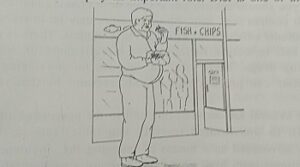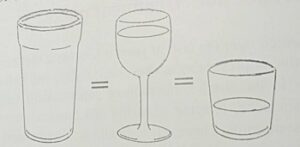Although high blood pressure does not usually have a single cause there are
some factors which can play an important role. Diet is one of these. High bloodHigh blood pressure is particularly common in people
. High blood pressure is particularly common in people
High blood pressure is particularly common in people
who are overweight. pressure is particularly common in people who are overweight, and
successful reduction of weight by a calorie restricted diet usually helps to
reduce blood pressure. Occasionally weight reduction alone is sufficient
treatment but more often it assists with tablets. Heavy drinking also raises blood pressure. A modest intake of alcohol
probably does no harm, but in general the average intake should not exceed
two or three pints of beer two or three times a week or its equivalent in other
forms of alcohol.  1 pint of beer is approximately equivalent to a glass of
1 pint of beer is approximately equivalent to a glass of
wine or a simple measure of spirits. It has been suggested that there is a connection between salt in the diet
and high blood pressure. Salt is certainly important in some forms of high
blood pressure, particularly when there is kidney damage, but its role in the
majority of patients is less clear, Although severe restriction of salt intake
can lower pressure, such diets are difficult for most people to follow for long
periods. Moderate salt restriction is more readily achieved, but its effects on
blood pressure in the long-term are not yet clearly established. Those wo
take excessive salt should cut back on their intake of added salt. To lower
sodium intake you should not use salt at table or in cooking and avoid foods
with a high salt content e.g., ham. Blood pressure may be lowered in some
hypertensive patients although the effect is fairly modest. There is also some
evidence that salt reduction increases the effectiveness of some blood
pressure-lowering drugs. There is at the moment no convincing evidence
that low slat diets can prevent high blood pressure. Further research is
needed.
A decrease in total fat consumption and in the proportion of saturated
(mainly animal), to unsaturated (mainly vegetable) fats in the diet is
currently widely advocated as a means of reducing the incidence of heart
attacks. Since patients with high blood pressure are a particularly high risk
group, this is worth considering seriously. It can be achieved by cutting
down on fatty foods (e.g., dairy products and fat meat) and substituting
polyunsaturated, fat (e.g., corn oil-soya and sunflower oil, etc). Such a
dietary change may also slightly lower blood pressure, so such diets may be
beneficial in this way as well. Although high blood pressure is probably not
directly related to cigarette smoking, cigarettes themselves undoubtedly  The risks of smoking for patients with high blood
The risks of smoking for patients with high blood
pressure are very great indeed cause coronary heart disease and arterial disease in the legs. Subjects with
high blood pressure already have an enhanced risk of developing such
problems and cigarettes are, therefore, particularly harmful. The risks of
smoking for patients with high blood pressure are very great indeed and
every effort should be made to stop smoking.